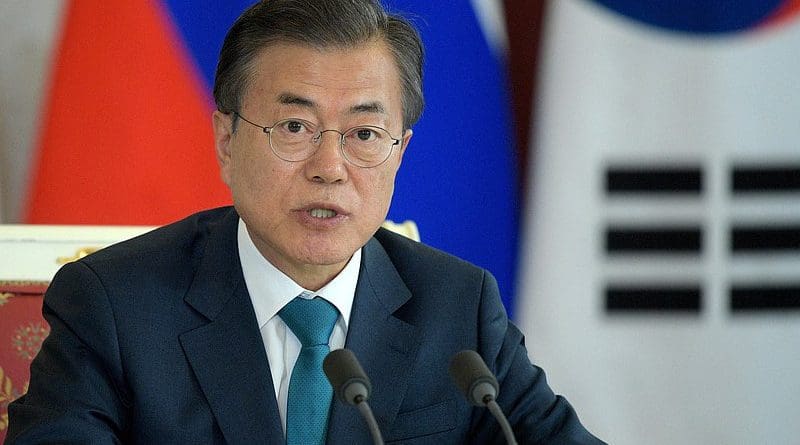Biden Faces Tricky Balancing Act On Korea – OpEd
By Arab News
By Andrew Hammond*
Friday will offer the latest example of why the Asia-Pacific is now the pre-eminent theater for US foreign policy, with South Korean President Moon Jae-in — intensifying the push for an improvement in inter-Korean relations during his remaining time in office — becoming only the second world leader to meet face-to-face with President Joe Biden.
Top of the agenda is the continuing nuclear danger posed by North Korea. This is one of the key issues that also dominated Biden’s first presidential face-to-face with Japanese Prime Minister Yoshihide Suga last month.
The kaleidoscope of relations between Pyongyang and Washington was in flux during the Donald Trump era, including when he became the first sitting US president to meet with a North Korean counterpart. However, the fundamental challenge facing Washington today regarding the hermit state remains much the same as four years ago. This is that missile tests have shown Pyongyang is close to developing a nuclear warhead capable of being fitted onto an intercontinental ballistic missile with the long-range capability to strike the US homeland. This was a red line for Trump during his presidency and will also be a serious political challenge for Biden, who has yet to appoint a special envoy to handle nuclear negotiations.
Suga and Biden last month condemned Pyongyang’s ballistic missiles tests of earlier this year, which were in violation of UN Security Council resolutions, and also called for the peninsula’s complete denuclearization. But this is no more than a starting point for the agenda that lies ahead following the Biden team’s recent policy review, which called for a focus on practical steps to reduce tensions while maintaining the goal of removing the North’s nuclear weapons.
The mood music here has turned almost uniformly negative since the stalling of the US-North Korea dialogue under Trump following the 2018 Singapore summit. In the subsequent Trump-Kim Jong Un meeting in Vietnam, there were big differences. These shortcomings were compounded by Trump’s characterization of what happened in Singapore. What was no more than a start to a potentially sustained strategic dialogue saw the president, for instance, declare that the “nuclear threat from North Korea is over,” giving the impression that he had already completed the immensely complicated process of de-escalating tensions in the world’s last Cold War-era frontier.
Today, as in 2018, the central challenge in the process is the differing US and Korean interpretations of what exactly would constitute denuclearization on the peninsula. To Trump, this appeared to mean unilateral disarmament. But for Kim it appeared to be much more about potentially lengthy negotiations, in which Pyongyang should be treated as an equal to the US, giving him further propaganda victories. In this context, it is little surprise Kim has been wary about making concrete commitments on specific timeframes, wanting to win further economic and political concessions from Trump (and now Biden) before any reduction in nuclear capabilities, let alone committing to full denuclearization.
As in Singapore, the chief issue for the White House to resolve is what, if any, sequencing is possible to move the process forward. After Vietnam, North Korea disputed Trump’s account that the reason the talks collapsed was because Kim asked for full sanctions rollback. Pyongyang claims it asked for only partial sanctions relief and that an offer was made to permanently halt nuclear and long-range rocket testing.
One reason Pyongyang will not move far or fast in its position is that Kim, not Trump, emerged as the bigger beneficiary of the process. The North Korean leader made few concrete concessions, while the Trump team called off joint military exercises between US and South Korean forces and held out the prospect of an easing of sanctions if Pyongyang did “something meaningful” on denuclearization. And this is also in a context where there is reported evidence that North Korea is continuing uranium enrichment and has stepped up missile production.
It is this diplomatic mess that Biden inherited from Trump, who was only able to secure ambiguous pledges to “denuclearize” from Kim. On a personal level, for instance, the North Korean head of state has assumed significantly higher political importance on the international stage in recent years. Chinese premier Xi Jinping has invited Kim for multiple trips to Beijing, including in 2018 — his first foreign tour since he assumed power in 2010 — and he has also visited Vladimir Putin in Russia.
The contrast between this feting of Kim and the situation in 2017, when the Trump team was debating a pre-emptive attack on North Korea, is striking. But the turnaround in tensions on the peninsula since then is very fragile, as the Biden team well understands, with potential key risks remaining that could re-escalate tensions and tip the peninsula into crisis again in the coming years.
- Andrew Hammond is an Associate at LSE IDEAS at the London School of Economics.

